Stage Fright (1950)
Directed by: Alfred Hitchcock
Written by: Alma Reville, James Bridie, Selwyn Jepson, Whitfield Cook
Starring: Jane Wyman, Marlene Dietrich, Michael Wilding, Richard Todd
HCF REWIND NO. 223: STAGE FRIGHT [US 1950]
RUNNING TIME: 117 min
AVAILABLE ON DVD
THE HITCHCOCK CAMEO: Walking by, and then turning back to give a prolonged stare at Eve Gill on the sidewalk. He is unconvinced and puzzled by her disguise to pose as Doris Tinsdale – the replacement maid of Charlotte Inwood
REVIEWED BY: Dr Lenera, Official HCF Critic
Eve Gill, an aspiring actress at RADA, is interrupted in rehearsal by her friend, and crush, actor Jonathan Cooper, the secret lover of flamboyant stage actress/singer Charlotte Inwood. He tells her that Charlotte visited him after killing her husband, wearing a bloodstained dress. He went back to her house for another dress, and was seen by Charlotte’s dresser Nellie Goode, but escaped the police and now needs help. Eve takes him to her father’s house on the coast to hide. Commodore Gill notices that the blood on Charlotte’s dress has been smeared on deliberately, leading he and Eve think that Jonathan was framed by Charlotte. Jonathan angrily destroys the dress and thus the most useful piece of evidence. Employing her acting skills, Eve begins to investigate…..
Nowhere near as interesting as his previous two films Rope or Under Capricorn but a bit more fun, Stage Fright, which has distinct echoes of Young And Innocent and Hitchcock’s earlier thriller set in a theatre environment Murder!, remains a minor entry in Hitchcock’s filmography, and I’m not going to make a case for it as being far better than it’s generally regarded to be. It is an enjoyable, relaxing watch though, the director clearly coasting and taking it easy after the experimentation of Rope and Under Capricorn and the difficult production of The Paradine Case, but still coming up with quite a pleasing film. It’s a quaint, very English picture which in some ways feels like it belongs with his 30’s movies, and will disappoint if you expect lots of knife-edge tension and exciting set-pieces, while even the dark psychological aspects are glossed over so the film stays on the level of a light romp, but it’s often genuinely funny, its wordy script is often very sharp, pretty much all of its characters are well rounded, and, even if he doesn’t seem to put much of himself into it, Hitchcock still seems to enjoy making a rare ‘whodunnit’ , the man often going on record to say how he preferred suspense over surprise.
This film, initially intended as the next release for Hitchcock’s production company Transatlantic Pictures until it folded, becamer the first of a four film deal Hitchcock made with Warner Bros. which gave him choice of material, cast and actors. A strange arrangement one might think, considering two out of his last three films had flopped at the box office, and even the third [Rope] had only been a minor success. In any case, Hitchcock and Alma, assisted by playwright Whitfield Cook who concentrated on the dialogue, set to work on a screenplay expanding Selwyn Jepson’s short story Man Running. The identity of the murderer was changed, there was no false flashback [false flashback you ask? More on this in a minute], and minor characters were beefed up. James Bridie polished some scenes. Hitchcock’s first fully-fledged British film since Jamaica Inn, Stage Fright featured a genuine movie icon, Marlene Dietrich, in its cast. Dietrich tended to have total control over her costumes [Christian Dior did them here], lighting and even acting, which amazingly Hitchcock let her have, and made a show of disliking Jane Wyman, which may have worked to the film’s good. Wyman had to be stopped surreptitiously glamourising herself to compete with Dietrich, but the production ran smoothly nonetheless. Most of Irene Handl’s performance as Miss Mason, the maid, was cut from the film, which was a minor success though heavily criticised in one major respect. Oddly, the French saw a slightly different edit which has yet to make its way onto DVD or Blu-ray. Some scenes were shortened, but two – a bar discussion scene, and Dietrich’s singing of The Laziest Girl In Town – are longer.
So what was it everyone seemed to hate back in 1950, to the point where Hitchcock ended up agreeing with them, and what’s all this stuff about a false flashback? Well, early on in the film somebody relates some events to somebody else and they proceed to take up about ten minutes of screen time. Near the end of the film, most of what we sure at the beginning is proved to be a lie. There was an unwritten rule that:‘the camera can’t lie”, and Stage Fright broke it. Thank God that films soon moved on from this restrictive point of view, though mostly in art house movies. In any case, as used in Stage Fright, the device proves to be most effective, and don’t murderers often lie anyway? In fact, the early scenes of Stage Fright wrong-foot the viewer in a very clever way, because it seems like you’re watching another one of Hitchcock’s ‘man on the run’ movies in the fashion of The 39 Steps, and not only that but one that seems to get the chase underway right from the very beginning. In fact, the lightning-paced opening section is very deceptive, the rest of the film adopting a more sedate movement, and it does soon get very dialogue-heavy, though the dialogue is often full of wit and the plot, which throws up a few surprises throughout, certainly keeps one interested.
After it initially seems that Jonathan is the main character, Eve Gill actually soon adopts that role, and the budding actress soon turns amateur detective as she decides to solve the murder, something which involves her posing as a maid to Charlotte, Dietrich’s character. She’s convinced Charlotte did it, and sets about unmasking her, but has to contend with a blackmailer and a ‘proper’ detective who also becomes the romantic interest after it soon becomes apparent that Jonathan doesn’t return Eve’s affections. The film seems content, for the most part, to coast likeably along, sometimes seeming more interested in giving some memorable small parts to British character performers like Joyce Grenfell as the crude proprietor of a shooting gallery and Miles Malleson as a slightly creepy busy-body in a pub, rather than moving the story along. At times Eva’s father, a typically wonderful performance by Alastair Sim perfectly balancing pathos, humour and grit [he has an especially fine moment when he cuts himself to smear blood on a doll’s dress, his facial expression changing perfectly while still remaining amusing], helps Eve in her quest. Much time is spent at a garden party where it’s pissing down, allowing Hitchcock to use his Foreign Correspondent sea of umbrellas again, and things begin to occur all over the place involving the main characters who, appropriately for a film with a theatre background, are constantly lying or pretending to be somebody else. The tension is very muted, but it’s well managed all the same throughout the lengthy sequence, and the film finishes in another of Hitchcock’s theatre climaxes. There’s some genuine fear at last as Eve find herself alone with the killer [who, as usual, prefers strangulation as his modus operandi], and a gruesome, if un-shown, death for him – severing in half by a safety curtain.
The laughs in this film come quite often, and are often of a decidedly quirky kind, right from an early scene where Jonathan, fleeing the police, jumps into his car and shuts the door, locks it and then locks the passenger door. The police come out, one on each side of the car, and the policeman on the passenger’s side tries to break the window with his arm, to which Jonathan points to a tiny sign on the glass which reads:“safety glass”. Eve’s father has the lion’s share of the funny lines, but Dietrich, in a line which she may have written herself, remarks: “Detectives. After all, what are they? Just policemen with smaller feet”. There are some directorially stylish moments, more than I actually remembered from the last time I saw this film, most notably Jonathan’s imagining of police enquiries being visualised as his face is superimposed on various brief scenes, and a lengthy camera move which follows Jonathan from a street [which is a studio mock-up] through the front door of a flat and upstairs to the bedroom. Hitchcock had Richard Todd to only mime the closing of the door behind him so the camera could follow him, but passed a shadow across his back to make it seem like the door had actually been shut. It’s seamless, and even the usual Hitchcock back projection seems better than usual and occasionally seems to be used for dramatic effect.
Wyman isn’t too convincing in her role, though her fake cockney maid Doris Tinsdale is an amusing creation, and she’s not helped by the script making us wonder why her character likes Jonathan so much. Michael Wilding is better than he was in Under Capricorn if nothing special, Todd is just bland, while Dietrich is Dietrich – her role requiring her to do little more than play herself. Her performance of the rather poor Cole Porter number The Laziest Girl In Town has her slink about in typical fashion, though her rendition is weak [possibly this was intentional, though I doubt Dietrich would have gone with that] and too heavy for the song. Hitchcock’s daughter Patricia appears as one of Eva’s RADA pals, and also doubled for Ryman in her ‘dangerous driving’ scene. The score by Leighton Lucas leaves a surprising number of scenes without music, especially some of the more dramatic ones. There’s a nice,slightly humorous theme for Eva and a pleasant, simple love theme, but not much else. They could have done more interesting and deeper things with the material for this film, and its cynical attitude to things like love and relationships [it’s even there in some of the supporting characters] jars a little with its light, almost picaresque tone, but Stage Fright remains an enjoyable diversion that is hard to dislike.
Rating: 










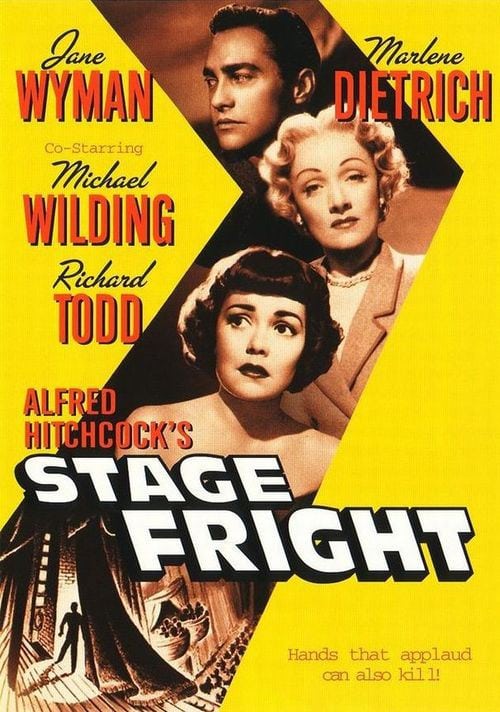
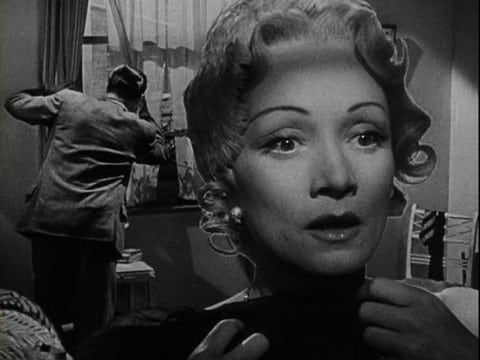
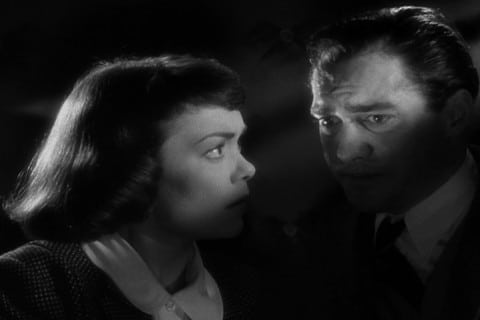

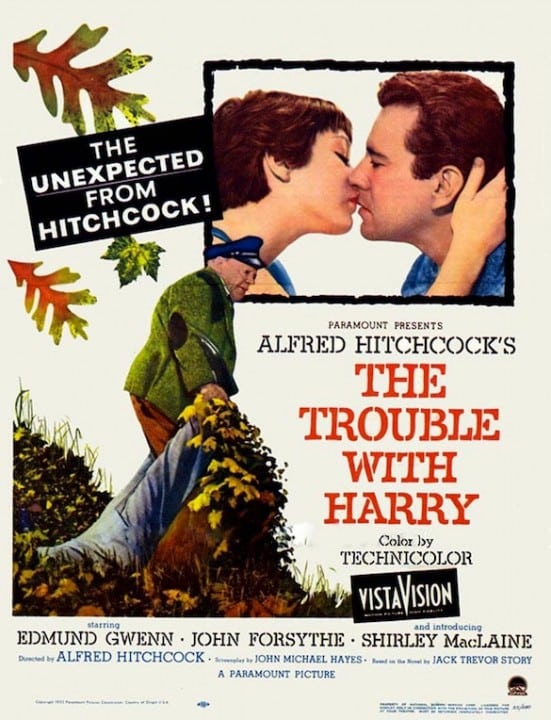
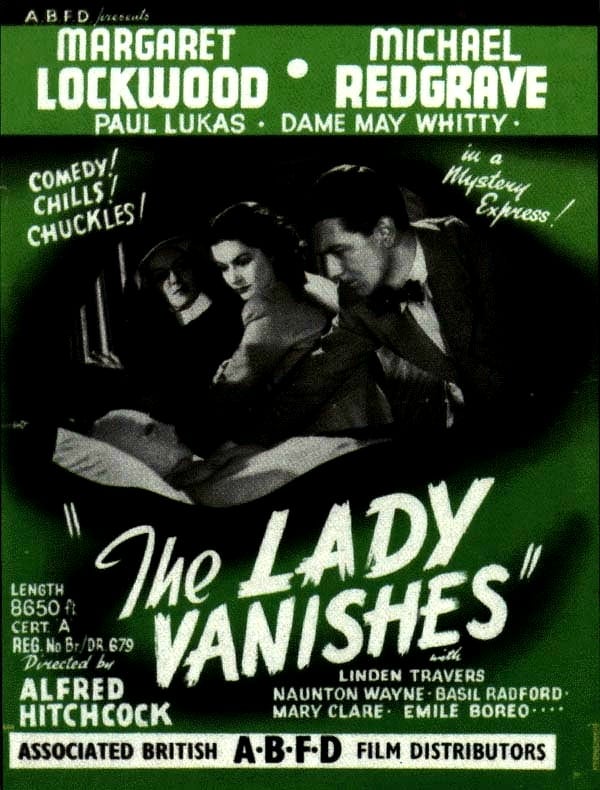
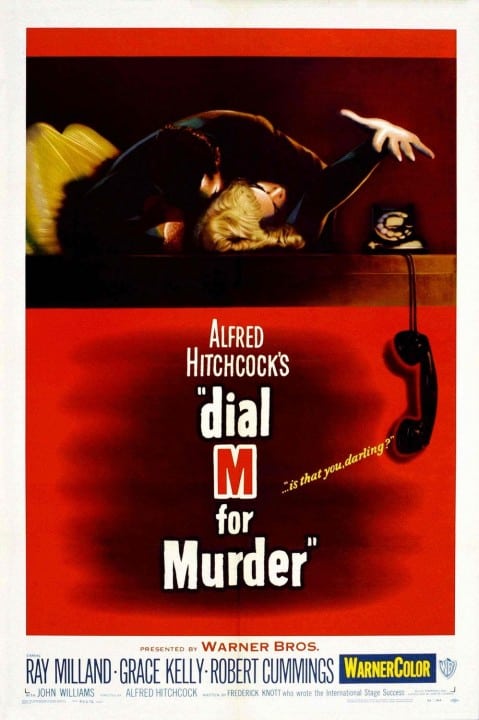
Be the first to comment